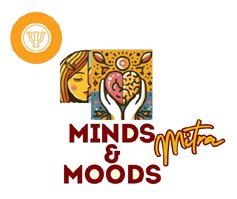Reclaiming Rest: A Guide to Insomnia Treatment Counselling 😴
Insomnia is more than just a sleepless night; it’s a persistent sleep disorder that can significantly impact daily life, leading to fatigue, irritability, and difficulty concentrating. It often co-occurs with other mental health conditions like anxiety and Depression, which a Depression therapist can address. While medication can be a temporary solution, Insomnia Treatment Counseling provides a long-term, sustainable approach by addressing the root causes and underlying thoughts and behaviors. This form of Personal counselling empowers you to understand your sleep patterns and develop healthy habits to reclaim restful sleep.
Meet Rrimi Bodalkar: A Compassionate Expert in Nagpur
For those in Nagpur seeking professional guidance, Rrimi Bodalkar is a highly recommended Sr. Psychotherapist / Mental Health Counsellor. Holding an M.A. in Psychology (Counselling) and a PGDMH (Clinical), she is also an NSDC Certified Psychometric Analysis & Learning Style Assessment specialist. Her expertise includes specializations in CBT, REBT, and DBT, making her adept at treating a wide range of issues from Mood disorder interventions and Personality development counselling to PTSD counselling and Trauma therapy. She is committed to providing personalized care and creating a supportive environment for individuals, couples, and families to address their mental health concerns.
Symptoms and Causes of Insomnia
Recognizing the signs of insomnia is the first step toward finding a solution. It’s not just about the number of hours you sleep but the quality of that sleep.
Symptoms:
- Difficulty falling asleep: Taking a long time to fall asleep after getting into bed.
- Waking up during the night: Waking up frequently and having trouble getting back to sleep.
- Waking up too early: Waking up hours before you intended to and not being able to fall back asleep.
- Daytime fatigue: Feeling tired, irritable, and not well-rested during the day.
- Difficulty with cognitive tasks: Trouble concentrating, remembering things, or performing tasks, which can contribute to Workplace stress or Academic stress.
Causes:
Insomnia is often a symptom of underlying issues, both physical and psychological.
- Stress and anxiety: Life transition counselling, Public speaking anxiety treatment, or managing Workplace stress and Burnout counselling can all be interconnected with sleep issues.
- Mental health conditions: Conditions like depression, anxiety disorders, and PTSD counselling are often linked to insomnia. Trauma therapy can also be crucial in addressing sleep disturbances caused by past events.
- Poor sleep hygiene: Irregular sleep schedules, use of electronics before bed, and a non-conducive sleep environment.
- Medical conditions: Chronic pain, certain medications, or other physical ailments.
- Lifestyle factors: Consumption of caffeine or alcohol late in the day.
The Therapeutic Approach to Insomnia
A Psychotherapist or Mental Health Counsellor specializing in sleep disorders will use a holistic approach. The most effective treatment for chronic insomnia is Cognitive Behavioral Therapy for Insomnia (CBT-I), a specialized form of CBT. The treatment procedure typically involves:
Initial Assessment: A thorough evaluation to understand your sleep habits, medical history, and potential underlying psychological factors.
Cognitive Restructuring: A key component of CBT-I, this helps you challenge Negative thinking and beliefs about sleep. For example, the belief that “I’ll never be able to sleep” can be replaced with more realistic, positive thoughts.
Behavioral Techniques: This involves implementing practical strategies to improve sleep hygiene. Your counsellor may guide you on Social skills training for daytime interactions, as well as:
- Stimulus Control: Associating your bed with sleep only, not with reading, watching TV, or worrying.
- Sleep Restriction: Temporarily limiting time in bed to increase the “drive” for sleep.
- Relaxation Techniques: Learning deep breathing, meditation, or progressive muscle relaxation to calm the mind and body before sleep.
Mood Disorder Interventions: Since insomnia and mood disorders are often linked, the counsellor may incorporate Mood disorder interventions to address the underlying psychological issues.
Frequently Asked Questions (FAQs)
Q1: What’s the difference between a Psychotherapist, a Counsellor, and a Psychologist?
A: A Psychologist often holds a doctoral degree and can conduct psychological testing, such as IQ testing or Personality assessment. A Psychotherapist or Mental Health Counsellor typically has a master’s degree and provides therapy.
Q2: Can Insomnia Treatment Counselling help with stress from relationships?
A: Yes. Stress from any source, including Relationship counselling or Couple therapy, can contribute to insomnia. By managing the stress through therapy, sleep often improves as a result.
Q3: Is CBT-I a long-term solution?
A: Unlike sleep medications, which can lead to dependency and have side effects, CBT-I addresses the core issues and provides you with skills you can use for life. It is considered the gold standard for long-term insomnia treatment.
Q4: Can a child with sleep problems see a counsellor?
A: Yes. A Child psychologist can help children with sleep issues, which may be linked to ADHD testing, Autism spectrum evaluation, or Social skills training. They can also offer Parenting support counselling to help parents manage their child’s sleep habits.
Q5: Is it possible to have an online consultation for insomnia?
A: Yes, many counsellors, including RRIMI BODALKAR, offer online sessions, making therapy accessible and convenient from the comfort of your home.

